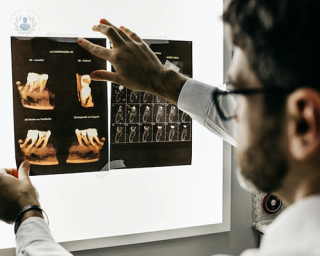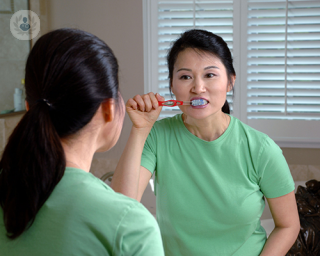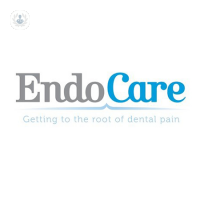What is endodontic retreatment?
Endodontic retreatment is needed if your tooth doesn’t heal as expected after initial endodontic treatment. After root canal treatment, there is a chance for the tooth to heal improperly causing pain and discomfort, for which you would need to undergo additional treatment.

What happens during retreatment?
Some reasons your tooth doesn’t heal properly might be because:
- The narrow or curved canals were not treated in the initial procedure
- Complicated canal anatomy wasn’t previously detected
- A cracked or loose crown or filling is exposing the tooth which has resulted in an infection
- Your tooth restoration didn’t prevent contamination inside of your tooth from your saliva
- Decay exposes the root canal material resulting in damage to the tooth from a bacterial infection
What happens during retreatment?
During retreatment, an endodontist will first proceed by administering local anaesthesia to reopen your tooth so you don’t feel any pain. Then, they will remove the filling materials that were placed in the root canals during the first procedure and carefully examine the tooth and search for additional canals or a new infection. They will then remove any infections, clean and shape the canals, and place new filling materials.
The opening in the tooth is then closed with a temporary filling. Once this heals, a new crown or other restoration is placed on the tooth to protect it.
06-15-2018 06-15-2018Endodontic retreatment
What is endodontic retreatment?
Endodontic retreatment is needed if your tooth doesn’t heal as expected after initial endodontic treatment. After root canal treatment, there is a chance for the tooth to heal improperly causing pain and discomfort, for which you would need to undergo additional treatment.

What happens during retreatment?
Some reasons your tooth doesn’t heal properly might be because:
- The narrow or curved canals were not treated in the initial procedure
- Complicated canal anatomy wasn’t previously detected
- A cracked or loose crown or filling is exposing the tooth which has resulted in an infection
- Your tooth restoration didn’t prevent contamination inside of your tooth from your saliva
- Decay exposes the root canal material resulting in damage to the tooth from a bacterial infection
What happens during retreatment?
During retreatment, an endodontist will first proceed by administering local anaesthesia to reopen your tooth so you don’t feel any pain. Then, they will remove the filling materials that were placed in the root canals during the first procedure and carefully examine the tooth and search for additional canals or a new infection. They will then remove any infections, clean and shape the canals, and place new filling materials.
The opening in the tooth is then closed with a temporary filling. Once this heals, a new crown or other restoration is placed on the tooth to protect it.


What is apicoectomy surgery, and how successful is it?
By Mr Corneliu Gherasim
2024-12-26
In this detailed guide to apicoectomy surgery, highly esteemed specialist endodontist Mr Corneliu Gherasim offers expert insight on when the procedure is required and how it is performed. The renowned specialist also sheds light on the success rates of apicoectomy surgery and how the use of advanced surgical techniques and technology positively impact patients’ recovery. See more


What is an apicoectomy?
By Professor Federico Foschi
2024-12-26
An apicoectomy is an endodontic surgical procedure which is carried out to remove the tip of the tooth's root, and the root end cavity is then filled with a type of biocompatible material. This might sound a little complicated, but leading endodontist Dr Federico Foschi is here to explain how exactly an apicoectomy is performed, why it is needed, and why it's different to a root canal procedure. See more


What is endodontic treatment?
By Dr Michael Sultan
2024-12-25
What are endodontics and what does this area of dentistry involve? Expert endodontist Dr Michael Sultan is here to explain the ins and outs of endodontic treatment (including root canal procedures). See more


What is interceptive orthodontics?
By Dr Asif Chatoo
2024-12-25
Around one-third of UK children have teeth which would benefit from orthodontic treatment. The majority who need orthodontics will start treatment around the age of 11 or 12. Interceptive orthodontics will benefit some children from an earlier age to avoid dental complications in the future. Orthodontist Dr Asif Chatoo tells us more about interceptive orthodontics and what children it can help. See more
Experts in Endodontic retreatment
-
Dr Michael Sultan
EndodonticsExpert in:
- Endodontic treatment
- Root canal treatment
- Dental pain
- Apicoectomy
- Surgical endodontics
- Endodontic retreatment
-
Professor Federico Foschi
EndodonticsExpert in:
- Endodontic treatment
- Root canal treatment
- Dental pain
- Apicoectomy
- Surgical endodontics
- Endodontic retreatment
-
Dr Adi Moran
EndodonticsExpert in:
- Endodontic treatment
- Root canal treatment
- Dental pain
- Apicoectomy
- Surgical endodontics
- Endodontic retreatment
-
Dr Satinder Matharu
EndodonticsExpert in:
- Endodontic treatment
- Root canal treatment
- Dental pain
- Apicoectomy
- Surgical endodontics
- Endodontic retreatment
- See all

Harley Street Dental Studio
Harley Street Dental Studio
52 Harley Street, Marylebone. W1G 9PY
No existe teléfono en el centro.
By using the telephone number provided by TOP DOCTORS, you automatically agree to let us use your phone number for statistical and commercial purposes. For further information, read our Privacy Policy
Top Doctors

Endocare
Endocare
99 Harley Street, W1G 6AQ
No existe teléfono en el centro.
By using the telephone number provided by TOP DOCTORS, you automatically agree to let us use your phone number for statistical and commercial purposes. For further information, read our Privacy Policy
Top Doctors
-
Harley Street Dental Studio
52 Harley Street, Marylebone. W1G 9PY, W1G Marylebone LondonExpert in:
- Porcelain veneers
- Crowns
- Fillings
- Endodontics
- Cosmetic dentistry
- Dental implants
-
Endocare
99 Harley Street, W1G 6AQ, Central LondonExpert in:
- Dental pain diagnosis
- Endodontics
- Surgical endodontics
- Root canal re-treatment
- Root canal treatment
- See all
- Most viewed diseases, medical tests, and treatments
- Tooth wear
- Tooth sensitivity
- Tooth abscess
- Facial pain
- Dental phobia
- Dental monitoring
- OPG X-ray (Orthopantomography)
- Dental pain
- Endodontic treatment
- CBCT





